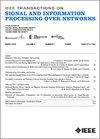A Proximal Gradient Method With Probabilistic Multi-Gossip Communications for Decentralized Composite Optimization
IF 3
3区 计算机科学
Q2 ENGINEERING, ELECTRICAL & ELECTRONIC
IEEE Transactions on Signal and Information Processing over Networks
Pub Date : 2025-08-20
DOI:10.1109/TSIPN.2025.3600766
引用次数: 0
Abstract
Decentralized optimization methods with local updates have recently gained attention for their provable ability to communication acceleration. In these methods, nodes perform several iterations of local computations between the communication rounds. Nevertheless, this capability is effective only when the network is sufficiently well-connected and the loss function is smooth. In this paper, we propose a communication-efficient method一种具有概率多八卦通信的近端梯度方法用于分散复合优化
具有局部更新的分散优化方法因其可证明的通信加速能力而受到关注。在这些方法中,节点在通信轮之间执行多次局部计算迭代。然而,这种能力只有在网络连接良好且损失函数平滑的情况下才有效。在本文中,我们提出了一种具有概率局部更新和多八卦通信的分散复合(光滑+非光滑)优化的通信高效方法$\textsc {MG-Skip}$,其步长与局部更新的数量和网络拓扑无关。对于任何无向连接网络,$\textsc {MG-Skip}$允许在强凸设置的大多数迭代中跳过多八卦通信,其计算复杂度为$\mathcal {O}(\kappa \log \frac {1}{\epsilon })$,通信复杂度仅为$\mathcal {O}(\sqrt{\frac {\kappa }{(1-\rho)}} \log \frac {1}{\epsilon })$,其中$\kappa$为损失函数的条件数,$\rho$反映网络拓扑的连通性,$\epsilon$为目标精度。理论结果表明,$\textsc {MG-Skip}$实现了可验证的通信加速,从而验证了局部更新在非光滑环境下的优势。
本文章由计算机程序翻译,如有差异,请以英文原文为准。
求助全文
约1分钟内获得全文
求助全文
来源期刊

IEEE Transactions on Signal and Information Processing over Networks
Computer Science-Computer Networks and Communications
CiteScore
5.80
自引率
12.50%
发文量
56
期刊介绍:
The IEEE Transactions on Signal and Information Processing over Networks publishes high-quality papers that extend the classical notions of processing of signals defined over vector spaces (e.g. time and space) to processing of signals and information (data) defined over networks, potentially dynamically varying. In signal processing over networks, the topology of the network may define structural relationships in the data, or may constrain processing of the data. Topics include distributed algorithms for filtering, detection, estimation, adaptation and learning, model selection, data fusion, and diffusion or evolution of information over such networks, and applications of distributed signal processing.
 求助内容:
求助内容: 应助结果提醒方式:
应助结果提醒方式:


